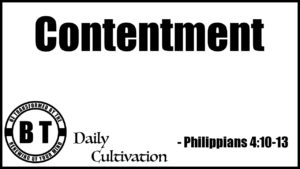
In Philippians 4:10-13, Paul is recognizing the gift that the Philippians sent to him. And in his gratefulness he speaks of what he has learned about being content. He says,
“I rejoiced greatly in the Lord that at last you renewed your concern for me. Indeed, you were concerned, but you had no opportunity to show it. I am not saying this because I am in need, for I have learned to be content whatever the circumstances. I know what it is to be in need, and I know what it is to have plenty. I have learned the secret of being content in any and every situation, whether well fed or hungry, whether living in plenty or in want. I can do all this through him who gives me strength.“
Paul says, “I have learned the secret of being content in any and every situation.” Meaning it was through all of these experiences of being hungry, of being fed, having plenty or being in want that he discovered something; this secret of being content.
Content defined – is a mental or emotional state of satisfaction maybe drawn from being at ease in one’s situation, body and mind.
Being content is a perspective that is greater than a situation or circumstance. Contentment is not the absence of wanting more. Paul used the words “being in need”, “hungry” and “in want”. If you are hungry, you want food. If you are cold, you want to be warm. If you are in prison (which he was when he wrote this), you want out. Contentment is not the absence of want, it is that absolute refusal to be defined by lack. Being content is fueled by the actual presence of God, that literally strengthens and builds up.
Contentment comes because I can do all this through him who gives me strength. This mentality will require perseverance, patient endurance, and commitment. All of which are absolutely necessary to finish the work of him who called us by his own glory and goodness. Who through these has given us his very great and precious promises so that through them we may participate in the divine nature, having escaped the corruption of the world caused by evil desires (2 Peter 1).
“My food,” said Jesus, “is to do the will of him who sent me and to finish his work.” John 4:34
Contentment is fueled, understood and experienced through the reality of Identity, Purpose, and Vision. “To do the the will of him who sent me and to finish his work”
